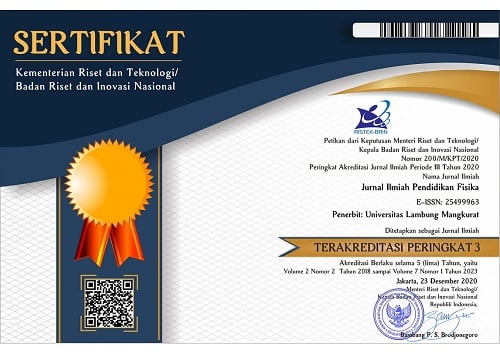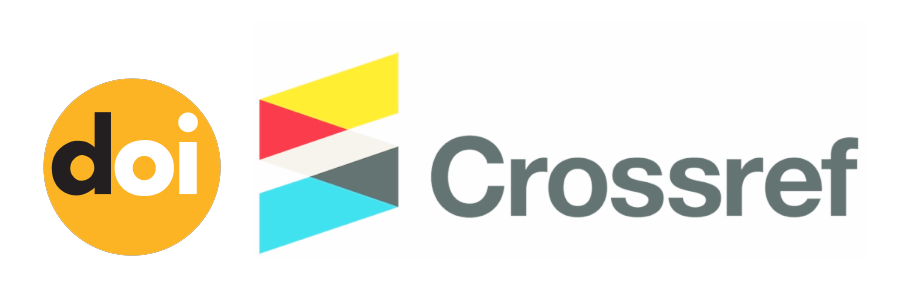Validity of a Coastal Environments-Based Physics Learning Module on the Theme of Temperature and Heat
Abstract
Keywords
Full Text:
PDFReferences
Annur, S., Sari, M., Wati, M., Misbah, M., & Dewantara, D. (2020). Developing of simple props using local materials to support natural sciences learning. Journal of Physics: Conference Series, 1422(012011), 0–6.
Arief, M. (2010). Inventarisasi sumber daya alam pesisir dan laut dengan menggunakan data satelit landsat studi kasus: kabupaten Maluku Tenggara. Jurnal Sains Dan Teknologi, 1(2).
Arikunto, S. (2013). Prosedur Penelitian Suatu Pendekatan Praktik. Jakarta: PT Rineka Cipta.
Badawi, A. I., & Qaddafi, M. (2015). Efektivitas Penggunaan Modul Berbasis Lingkungan terhadap Hasil Belajar Peserta Didik Kelas VII SMP Negeri 28 Bulukumba. Jurnal Pendidikan Fisika, 3(2).
Baharuddin, & Daulay, I. (2017). The development of computer-based learning media at a vocational high school. International Journal of Geomate, 12(30).
Bahri, S., Kusumawati, L., & Nuraini, L. (2017). STEAM education based on local wisdom of coffee plantation in Jember to improve competitiveness at 21 century. Pancaran Pendidikan, 6(3).
BNSP. (2013). Standar isi. Jakarta: Depdiknas RI.
Brahim, T. . (2007). Peningkatan Hasil Belajar Sains Siswa Kelas IV Sekolah Dasar melalui Pendekatan Pemanfaatan Sumber Daya Alam Hayati di Lingkungan Sekitar. Jurnal Pendidikan Penabur, 09, 37–49.
Dewantara, D., Febrianti, Wati, M., & Mastuang, M. (2019). Development of simple machines props to train student’s science process skills. Journal of Physics: Conference Series, 1171(1).
Enersy, D., Karyadi, B., & Winarni, E. W. (2017). Studi Komunitas Nekton Di Kawasan Konservasi Kura-Kura Universitas Bengkulu Dan Pengembangan Pembelajaran Berbasis Lingkungan. PENDIPA Journal of Science Education, 1(1).
Gafrani, N. W., & Mulyanratna, M. (2013). Penerapan pembelajaran kontekstual berbasis lingkungan dengan keterampilan proses terhadap hasil belajar siswa kelas XI pada materi fluida statis di SMA Negeri 2 Tanggul–Jember. Inovasi Pendidikan Fisika, 2(3).
Hobri. (2010). Metodologi Penelitian Pengembangan: Aplikasi pada Penelitian Pendidikan Matematika. Jember: Pena Salsabila.
Imami, W. N., Prihandono, T., & Supriadi, B. (2017). The development of contextual science module for middle school with concept mapping. Pancaran Pendidikan, 6(3).
Misbah, M., Dewantara, D., Hasan, S. M., & Annur, S. (2018). The Development of Student Worksheet By Using Guided Inquiry Learning Model To Train Student’S Scientific Attitude. Unnes Science Education Journal, 7(1), 19–26.
Nieveen, N. (2013). Educational Design Research. Enschede: Netherlands Institute for curriculum development.
Nugraha, D. A., & Binadja, A. (2013). Pengembangan bahan ajar reaksi redoks bervisi SETS, berorientasi konstruktivistik. Journal of Innovative Science Education, 2(1).
Nuraini, L. (2017). Pengolahan bahan ajar tentang pengolahan tebu sebagai energi terbarukan untuk membelajarkan kemampuan literasi sains pada mahasiswa calon guru fisika. Prosiding Seminar Nasional Fisika (SiNaFi), 3(1).
Oktaviana, D., Hartini, S., & Misbah, M. (2017). Pengembangan Modul Fisika Berintegrasi Kearifan Lokal Membuat Minyak Lala Untuk Melatih Karakter Sanggam. Berkala Ilmiah Pendidikan Fisika, 5(3), 272–285.
Prastowo, A. (2015). Panduan Kreatif Membuat Bahan Ajar Inovatif. Yogyakarta: Diva Press.
Preliana, E. (2015). Pengembangan Alat Peraga Sains Fisika Berbasis Lingkungan untuk Materi Listrik Statis Pada Siswa Kelas IX SMP Negeri 3 Pleret. JRKPF UAD, 2(1), 6–11.
Sipayung, T. N., & Simanjuntak, S. D. (2017). Validitas modul matematika Kelas X SMA dengan menerapkan variasi model pembelajaran kooperatif. JMES (Journal of Mathematics Education and Science), 3(1).
Sitepu, B. P. (2012). Penulisan Buku Teks Pelajaran. Bandung: Remaja Rosdakarya.
Sudjana, N., & Rivai, A. (2010). Media pengajaran. Bandung: Sinar Baru Algensindo.
Wicaksono, I., Wasis, & Madladzim. (2017). The effectiveness of virtual science teaching model (VS-TM) to improve student scientivic creativity and concept mastery on Senior High School physics subject. Journal of Baltic Science Education, 16(4).
Winarni, E. W. (2016). Pembelajaran Abad 21 Berbasis Karakter dan Lingkungan untuk Mewujudkan Generasi Masa Depan Kreatif, Produktif, dan Afektif. Pendidikan Guru Sekolah Dasar, 1(1).
Yuliacahyani, Prihandono, T., & Lesmono, A. D. (2017). Pengembangan modul pembelajaran IPA fisika materi suhu dan pemuaian berbasis potensi lokal “kerajinan logam sayangan” untuk siswa SMP di Kalibaru Banyuwangi. Jurnal Pembelajaran Fisika, 6(2).
Zukmadini, A. Y., Karyadi, B., & Trisnawati, W. (2018). Strategi Pembelajaran Biologi Berbasis Lingkungan Melalui Kombinasi Pembelajaran Indoor dan Outdoor Sebagai Upaya Meningkatkan Keterampilan Proses Siswa SMA. Prosiding Seminar Nasional Pendidikan Biologi, 1(1).
DOI: https://doi.org/10.20527/jipf.v4i1.1773
Refbacks
- There are currently no refbacks.
Indexed by: Jurnal Ilmiah Pendidikan Fisika is licensed under a creative commons attribution-share alike 4.0 international license
Statistics Counter |
















